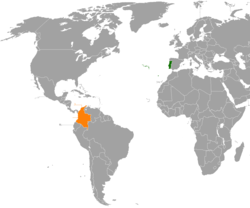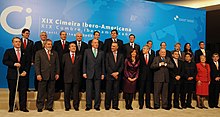Colombian-Portuguese relations

|
|
|
|
|
| Portugal | Colombia |
The Colombian-Portuguese relations describe the intergovernmental relationship between Colombia and Portugal . The countries have had direct diplomatic relations since at least 1926, dating back to the first diplomatic relations since 1857.
The bilateral relations are considered to be very good and exist today especially in the increasing economic and cultural exchange. Politically, the countries are partners in a number of international organizations, including the Latin America Summit and the Latin Union . The historical presence of Portuguese in Colombia also plays a role. Especially in the 17th century, Portuguese slave traders were active in what is now Colombia, but also missionaries, doctors and craftsmen, etc. a.
In 2015, 899 Colombians were registered in Portugal, with 399 most of them in the capital Lisbon . The remittances in the same year amounted to 1.85 million euros.
In 2008, 234 Portuguese citizens were registered in Colombia in the Portuguese consulates, and in 2016 remittances to Portugal amounted to 210,000 euros.
history
To 1900
Despite the Portuguese-Spanish Treaty of Tordesillas , a large number of Portuguese traders, craftsmen, mercenaries and artists tried their luck in the parts of South America assigned to Spain, including today's Colombia.
Portuguese slave traders in particular were present in Colombia, where they sold slaves from Africa. A number of words in the everyday language of Colombia that are of African origin go back to this time. These include a particularly large number of terms relating to pastures and residential accommodation, such as Kikuyo , Pangola , Angola , Guinea , Pará , Palenque , Quilombo or Chambacú . Place names such as Quebrada de Portugal in the district of Barranco de Loba in the Departamento de Bolívar also go back to the presence of Portuguese.
In 1607, the Portuguese doctor João Mendes Neto described in Discursos Medicinales the natural medicine he applied to Spaniards, Portuguese, blacks and indigenous peoples alike . His Spanish-language manuscript of the Discursos remained unprinted and was not published until 1989. Neto came from the Portuguese Miranda do Douro and after studying medicine at the Spanish University of Valladolid went to South America, where he settled in Cartagena de Indias on the Colombian Caribbean coast.
The Kingdom of Portugal concluded its first trade and shipping agreement with the Republic of New Granada on April 9, 1857 , from which the United States of Colombia developed in 1863 , which in 1886 assumed the current name of Colombia.
Since 1900
On July 10, 1913, the Portuguese Legation was opened in Panama , whose administrative district would later include Colombia in addition to Costa Rica and Venezuela. After the diplomatic mission in Panama was closed in 1919, the Portuguese embassy in Venezuela also became responsible for Colombia on September 2, 1926.

In 1944 the first Portuguese legation was established in Bogotá. In 1948, the Portuguese ambassador, who is based in Mexico City, was the first official Portuguese ambassador to Colombia to be accredited here . In 1962 the Portuguese embassy was opened in Bogotá, where the permanent representative of Portugal for Colombia has been based.
The Estado Novo dictatorship in Portugal ended with the Carnation Revolution on April 25, 1974 . On May 3, 1974, the Portuguese embassy in Bogotá received Colombian recognition from the new government in Lisbon.
On December 28, 1978, the two countries signed a bilateral economic agreement in Lisbon.
Relationships intensified in the 2000s, especially since the positive development in the armed conflict in Colombia since 2012 and the general development of the country since then. A series of mutual high-level visits accompanied this development. For example, during his state visit in April 2013, the Portuguese President Cavaco Silva visited the most important government offices and a. also the Bogotá Book Fair and opened the Portuguese pavilion at the Feria Internacional de Bogotá , Colombia's most important trade fair for industry and consumer goods, where Portugal was the guest of honor in 2013.
Portuguese armed forces are involved in the UN mission UNMCOL , which has been monitoring and verifying the ceasefire and the end of hostilities in Colombia since UN resolution 2261 of 25 January 2016.
diplomacy
- Portugal's representations in Colombia
The administrative district of the Portuguese embassy in Venezuela also included Colombia from 1926. In 1944 Portugal opened its first legation in Bogotá. Portugal's representatives, based in Mexico City (1948) and Havana (1956), remained double accredited there until the first Portuguese ambassador took up his service at the new official headquarters in Bogotá in 1962.

Jorge César Rosa de Oliveira , Portuguese ambassador to Mexico, was accredited as the first Portuguese ambassador to Colombia on March 2, 1948 , and Salvador Sampayo Garrido became the first Portuguese ambassador in 1962 with his official seat in Bogotá. The embassy resides there today at Calle 99 number 7A-77 in the Edifício Advance building.
There are also Portuguese honorary consulates in Cartagena , Cali and Medellín .
- Colombia's representations in Portugal
The Colombian embassy in the Portuguese capital Lisbon has existed since 1955. Today it resides in the Palácio Sottomayor in Avenida Fontes Pereira de Melo number 16. This is also where the Colombian consulate in Portugal is housed, and there is another consulate in Porto.
economy

In the course of Colombia's economic recovery after the armed conflicts largely ended in 2012, Portuguese investments in Colombia also increased. A well-known example is the supermarket chain Tiendas Ara , which was successfully launched in 2013 by the Portuguese retail group Jerónimo Martins . In 2018, a total of 412 Portuguese companies were active in Colombia.
The Portuguese Chamber of Commerce AICEP has an office in Colombia at the Portuguese Embassy. The Colombian-Portuguese Chamber of Commerce has an office in Bogotá ( Câmara do Comércio Colombo-Portuguesa ) and one in the Torres das Amoreiras in Lisbon ( Câmara de Comércio e Indústria Luso-Colombiana ), with further offices in Porto and Medellín.
In 2018, Portugal exported goods and services worth 76.9 million euros to Colombia ( 2017 : 67.4 million; 2016 : 66.1 million; 2015 : 81.0 million; 2014: 78.6 million .; 2013: 52.4 million; 2012: 37.2 million), of which 27.4% were machines and devices, 16.1% vehicles and vehicle parts, 13.7% chemical-pharmaceutical products, 9 , 3% plastics, 8.4% metals and 6.8% agricultural products.
In the same period, Colombia delivered goods and services worth EUR 311.7 million to Portugal ( 2017 : 363.9 million; 2016 : 282.6 million; 2015 : 281.2 million; 2014: 210.2 million .; 2013: 200.2 million; 2012: 276.9 million), of which 90.9% of the goods were fuels, 6.8% agricultural products, 0.9% food and 0.3% rubber and plastics .
In 2018, Colombia ranked 56th as a buyer and 31st as a supplier for Portuguese foreign trade in goods. In Colombia's foreign trade in goods, Portugal ranked 22nd among buyers and 43rd among suppliers.
Culture

The Portuguese cultural institute Instituto Camões is present in Colombia, in addition to various collaborations, in particular with a lecturer at the state Universidad Nacional de Colombia and the private Universidad de los Andes .
Fernando Pessoa and José Saramago can be considered the most famous and most widely read Portuguese authors in Colombia, while Gabriel García Márquez can be considered the most popular Colombian author in Portugal. Both Márquez (1982) and Saramago (1998) received the Nobel Prize in Literature .
Sports
Soccer
The Colombian national soccer team and the Portuguese selection have not yet met, neither the men nor the two women (as of February 2017).
Colombian football players often compete for Portuguese clubs, such as Santiago Arias , Fredy Montero and Teófilo Gutiérrez at Sporting Lisbon or Edwin Congo at Vitória Guimarães . Colombians have played particularly often at FC Porto , including Falcao , James , Juan Quintero , Wason Rentería , Jackson Martínez and Fredy Guarín . Abel Enrique Aguilar's move to the traditional Portuguese club Belenenses Lisbon became known in 2016 because it was handled via the WhatsApp smartphone service .
Cycling
Colombian racing cyclists and teams also regularly take part in Portuguese races, most recently with the Boyacá Raza de Campeones team at the Tour of Portugal in 2016 . The junior race Volta a Portugal do Futuro won the Colombian Wilson Enrique Rodriguez in 2016 .
The 2009 Grand Prix du Portugal stage race was won by the Colombian Sergio Henao .
At the 2001 UCI Road World Championships in Lisbon, Colombia won a bronze medal, while hosts Portugal failed to win a medal. At the UCI Road World Championships 1995 in Bogotá, however, both went empty-handed, as did the UCI Rail World Championships 2014 in Cali, Colombia, and the UCI Rail World Championships 1995 in Bogotá.
Roller hockey
Colombia qualified for the roller hockey world championship in Oliveira de Azeméis , Portugal in 2003. It finished there as 15th, while Portugal won its 15th world title.
Web links
- Overview of Colombian-Portuguese diplomatic relations at the Diplomatic Institute in the Portuguese Foreign Ministry
- Website of the Portuguese Embassy in Colombia ( Portuguese , Spanish and English)
- Website of the Colombian Embassy in Portugal (Spanish and Portuguese )
- Website of the Colombian-Portuguese Chamber of Commerce ( Portuguese and Spanish)
Individual evidence
- ↑ a b c d e f g Overview of diplomatic relations between Colombia and Portugal , website of the Portuguese embassy in Colombia (Portuguese, Spanish and English), accessed on March 18, 2017
- ↑ a b Overview of diplomatic relations with Colombia at the Diplomatic Institute in the Portuguese Foreign Ministry , accessed on May 4, 2019
- ↑ a b Fernando Cristóvão (Ed.): Dicionário Temático da Lusofonia. Texto Editores, Lisbon / Luanda / Praia / Maputo 2006 ( ISBN 972-47-2935-4 ), p. 791.
- ↑ Sum of the number of Colombians in the official immigration statistics by district , Portuguese Immigration and Border Agency SEF, accessed on March 18, 2017
- ↑ Website on Colombian-Portuguese migration (Table A.6) at the Portuguese Scientific Observatório da Emigração, accessed on March 4, 2017
- ↑ Website on Colombian-Portuguese migration (Tables A.3 and A.6) from the Portuguese scientific Observatório da Emigração, accessed on March 4, 2017
- ↑ a b Fernando Cristóvão (Ed.): Dicionário Temático da Lusofonia. Texto Editores, Lisbon / Luanda / Praia / Maputo 2006 ( ISBN 972-47-2935-4 ), p. 790.
- ↑ Overview of the high-level Luso-Colombian state visits to the Embassy of Colombia in Lisbon, accessed on March 18, 2017
- ↑ Information on the United Nations Mission in Colombia of the General Staff of the Portuguese Armed Forces, accessed on April 14, 2019
- ^ Website of the Portuguese embassy in Colombia ( Portuguese , Spanish and English), accessed on March 18, 2017
- ↑ List of honorary consulates on the website of the Portuguese Embassy in Colombia , accessed on March 18, 2017
- ↑ List of Portuguese diplomatic missions abroad , website of the Portuguese Ministry of Foreign Affairs , accessed on March 18, 2017
- ^ Website of the Colombian Embassy in Portugal (Spanish and Portuguese ), accessed on March 18, 2017
- ↑ Entry of the Colombian consulate on www.embaixadas.net, accessed on April 25, 2017
- ↑ a b c d Bilateral economic relations between Portugal and Colombia , Excel file retrieval from the Portuguese Chamber of Commerce AICEP , accessed on April 14, 2019
- ↑ Overview of the activities in Colombia , website of the, accessed on March 18, 2017
- ↑ Overview of contacts on the website of the Luso-Colombian Chamber of Commerce (Portuguese and Spanish), accessed on March 18, 2017
- ↑ Overview of the activities in Colombia , website of the Instituto Camões, accessed on March 18, 2017
- ↑ Belenenses contratou internacional colombiano por Whatsapp [ Belenenses sign Colombian national players via Whatsapp], article from February 3, 2016 on the Portuguese football portal www.maisfutebol.iol.pt, accessed on March 18, 2017


